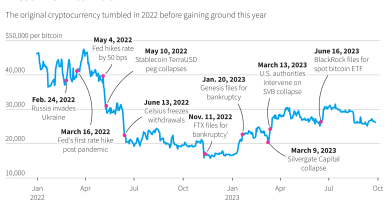Cryptocurrency Execs Charged With Running $11 Million Ponzi Scheme

Executives of a US company are being accused of raising at least $11 million through a cryptocurrency-based Ponzi scheme.
This week, the US Commodity Futures Trading Commission (CFTC) said that a civil enforcement action has been filed against David Gilbert Saffron and Circle Society, Corp., a Nevada-based firm.
According to prosecutors, Saffron allegedly operated a Ponzi scheme with the assistance of other defendants at the company, soliciting and accepting a minimum of $11 million in both Bitcoin (BTC) and US dollars.
These funds were taken from investors on the promise that their ‘investment’ would be traded and exchanged for binary options on foreign currencies as well as various cryptocurrencies. Participants were reportedly promised a guaranteed return of 300 percent.
As is usually the case with a lure of huge returns for no effort, and guaranteed to boot, the promise was empty.
See also: OneCoin ‘CryptoQueen’ sued over alleged $4bn cryptocurrency Ponzi scheme
The CFTC says that from December 2017 to the current date, a Ponzi pool was operated by Circle Society, backed by fraudulent claims concerning Saffron’s trading experience.
However, rather than using cash offered by 14 investors to trade in binary options, the funds were used to pay off other participants, perpetuating the scheme further.
Saffron and Circle Society are charged with fraudulent solicitation, misappropriation, and registration violations. An order has also been issued and extended by a US court to freeze their assets.
“Fraudulent schemes, like that alleged in this case, not only cheat innocent people out of their hard-earned money, but they threaten to undermine the responsible development of these new and innovative markets,” said CFTC Chairman Heath Tarbert.
CNET: Now you can log onto Windows with a hardware security key
The CTFC hopes the action will result in the full compensation of victims, trading bans, and penalities — but cautions that unless the case is proved and money can be recovered, there may not be any restitution possible.
A hearing is scheduled for October 29, 2019.
Ponzi schemes, fraudulent Initial Coin Offerings (ICO), and exit scams are rife in the cryptocurrency space and are a headache for regulators to manage.
In May, the operators of OneCoin, Konstantin Ignatov and self-confessed ‘crypto queen’ Ruja Ignatova, became central to a class-action lawsuit that claims the pair ran a multimillion-dollar cryptocurrency Ponzi scheme.
TechRepublic: How to add public SSH keys for users in Cockpit
The complainants say that Ignatov and Ignatova’s ICO “purported cryptocurrency that never really existed, on a blockchain that never really existed, born from mining farms that never really existed, yet fraudulently sold to investors throughout the world through a densely-packed multi-level-marketing system.”
OneCoin is estimated to have generated $4 billion in revenue. A whistleblower that has spoken out against the project has reportedly received death threats. The Bulgaria-based company is still trading.
Previous and related coverage
Have a tip? Get in touch securely via WhatsApp | Signal at +447713 025 499, or over at Keybase: charlie0
READ MORE HERE



